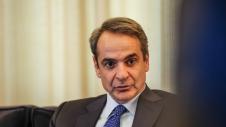In an environment of complete uncertainty, Greece is scrambling to implement a plan to limit the impact from the coronavirus in the country's tourism sector, in a bid to prevent this year's season from being completely lost without knowing, however, when air travel restrictions in Europe will be lifted.
According to sources, the government is taking steps at two levels to ensure that there will be tourists visiting the country this year:
1-In recent days, Greece has been making efforts through diplomatic channels to take advantage of its successful handling of the pandemic to reach agreements with governments of countries in the wider region, such as Israel, Scandinavian nations and Bulgaria, for the arrival of visitors this summer under controlled health conditions and in specific tourist units.
Through ties with countries that have not faced serious problems from the pandemic, an attempt is being made to find a way to sidestep problems that are sure to arise in the tourism sector's main European markets (Britain, Germany, France) hit hard by the coronavirus.
2-Through contact with leading European and international tour operators, Greece is looking to clinch special agreements for safe healthy tourism in the country. As the Minister of Development, Adonis Georgiadis, pointed out on Friday, the goal is for large tour operators to bring to Greece tourists who want to travel to the Mediterranean, as the country has a strong advantage, regarding its health conditions, over competing destinations.
According to the minister, Greece may not have a record tourism season this year but has the opportunity to gain a significant share of the market this year and next, from a smaller tourism market due to its good performance in managing the pandemic.
Of course, these initiatives are not intended to restore tourism to normal and secure a performance comparable to last year, but it is estimated that they could prevent the very bad scenario for the country where income in the sector falls 80 percent from last year's levels. Additionally, an effort will be made to stimulate domestic tourism, although the size of domestic tourism is too small to offer any substantial relief to the industry.
Smart choices
However, the messages coming from Brussels regarding this year's tourist season are no longer completely negative. It is noteworthy that the President of the Commission, Ursula von der Leyen, hastened to correct previous statements, in which she urged Europeans not to make plans for summer vacations. In newer statements, she appeared more optimistic, saying that "we will find smart solutions for summer vacations. Maybe a little different, with hygiene measures, with a little more social distancing. But it is important to understand that we will find solutions."
Regarding the plan to restart the economy, the Association of Greek Tourism Enterprises (SETE) has stressed that there must be a pan-European stance and that it should not be rushed if the protocols make traveling difficult. Meanwhile, hotels in Greece are preparing to open but this will be done with special, strict health rules. Also, their business plans will be adapted based on the specific conditions that are formed. Many units are likely to operate at reduced capacities, depending on demand levels.









